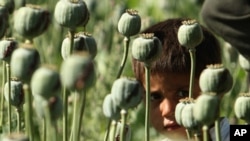The United Nations department that monitors global drug trafficking says Afghanistan's opium production may rise by more than two-thirds this year. In a new report, the U.N. warns the resulting increase in profits will translate into even more money to fund insurgent groups in the war-ravaged country.
The U.N.’s Office on Drugs and Crime says Afghan farmers of opium - the main ingredient in heroin - are expecting higher yields this year, as their fields recover from a crop disease that lowered supply last year.
Afghanistan was already supplying more than 80 percent of the world’s opium, but with speculation and market insecurity driving prices higher than ever, the U.N. report says even more areas within the country are being cultivated.
Afghanistan’s role in what the U.N. conservatively estimates to be a $66 billion world opium trade brings in up to $2 billion a year - nine percent of the country's gross domestic product.
The UNODC says at least one million Afghan families are affected by addiction to opium-related drugs, and the number is growing. Intravenous injection habits are reported to be fueling an epidemic of the AIDS-causing HIV virus in the country.
The UNODC's representative in Afghanistan, Jean-Luc Lemahieu, says the drug trade is destabilizing.
“The production and trafficking of narcotics inhibits security … within Afghanistan, the region, and internationally," said Lemahieu. "We all are being burnt by the same flame.”
Lemahieu says insurgent groups, led by the Taliban and including the Haqqani network, keep a significant slice of the drug profits to fund their operations.
“You could argue that about 10 percent would go to the insurgents, or 200 million [dollars] … Potentially, the insurgents this year will make 700 million [dollars]," said Lemahieu.
The NATO-led International Security Assistance Force in Afghanistan says it takes the drug and insurgency connection very seriously.
“Drugs are the biggest financer of the insurgents," said Brigadier General Carsten Jacobsen, a Kabul ISAF spokesman. "That has to be stopped, and we have made progress. Only in the last three weeks, three-quarters of a billion dollars worth of drugs - found and destroyed.”
In its report, the United Nations has also urged Afghanistan’s neighbors - including Pakistan - to uproot networks on their side of the Afghan border that facilitate drug trafficking. A major chunk of Afghanistan’s drug exports are smuggled through both Pakistan and Iran.




